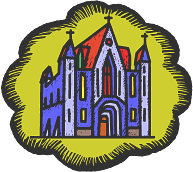For more information on finding a correct location, click on the Education tab at www.GRAonline.com click here. Select the Course 1: A Brief Overview of Family History Procedures. Read Lesson 1, pages 4 to 10. Watch for information about learning the proper location. Below are some other unique American sources that have the potential of giving the name of birth for an ancestor: LIFE INSURANCE RECORDS Life insurance records can be a valuable source of information for all American ancestors as well as Irish emigrants. Because insurance benefits go to designated heirs, details listed in insurance policies or claims include information about both the insured and the heirs. There were details listed on the Union Pacific Railroad insurance claim for an ancestor including her date and place of birth in Ireland. RECORDS OF RELIGIOUS ORDERS
EMPLOYMENT RECORDS Various types of employment records were generated by many businesses throughout the world such as the government (military and postal service are two examples), railroads, schools, police forces, shipping companies, and the list goes on. Employment records can be very useful as many provide personal details about employees including dates and places of birth. These types of records are often difficult to locate, but some may be found within the family�s papers. SOCIAL ORGANIZATION RECORDS Many people joined social organizations. These organizations include the Masons, Orange Order, Grand Army of the Republic (a society for veterans of the Civil War), Catholic Daughters, Odd Fellows, Ancient Order of the Hibernians and others. Membership records created by these organizations often contain genealogical information. Of note are the detailed records created by the Grand Order of the Republic. INSTITUTIONAL RECORDS Hospitals, orphanages, prisons and other institutions created records of their inmates. These records often include genealogical information. One client had a difficult time locating her ancestor in Ireland. All the tradional sources didn't seem to work for her. A nationwide Internet search by our Irish specialist found someone of the same surname searching about the same time period who lived in Australia. The client did not want to "waste her time that far away from home" so spent the next year trying other resources. We were finally able to convince her to allow us to contact this Australian resource. She came back to us, and we contacted the Australian cousin, as she turned out to be, who had the family Bible, papers, and the name of the parish in Ireland. You just never know which member of the family, which brother, sister, aunt or uncle, will have retained the papers and may be looking for you today! MISCELLANEOUS CHURCH RECORDS |
|
|
 Sons and daughters in many Irish Catholic families joined religious orders. In the ancestor found on the insurance claim, her sister, Mary Kate, was a nun (Sister Mary John) and administrator at St. Catherine�s Hospital in Omaha, Nebraska. This hospital was associated with the Sisters of Mercy order. Records about nuns and priests were kept by the various religious orders. These records are usually held by the parent organization. Diocesan archives may also have genealogical information about nuns and priests.
Sons and daughters in many Irish Catholic families joined religious orders. In the ancestor found on the insurance claim, her sister, Mary Kate, was a nun (Sister Mary John) and administrator at St. Catherine�s Hospital in Omaha, Nebraska. This hospital was associated with the Sisters of Mercy order. Records about nuns and priests were kept by the various religious orders. These records are usually held by the parent organization. Diocesan archives may also have genealogical information about nuns and priests.